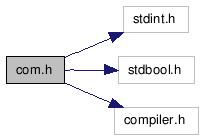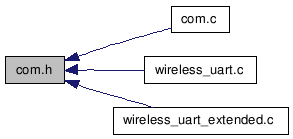| AVR Z-LINKŪ | |||||
This file contains the function prototypes for the Transceiver Access Toolbox, hence it is an API. The Transceiver Access Toolbox is an abstraction layer that hides the details of the radio transceiver from the end-user. The goal for the Transceiver Access Toolbox is to wrap the services that the radio transceiver can perform into easy to use functions.
Copyright (c) 2006, Atmel Corporation All rights reserved.
Redistribution and use in source and binary forms, with or without modification, are permitted provided that the following conditions are met:
1. Redistributions of source code must retain the above copyright notice, this list of conditions and the following disclaimer.
2. Redistributions in binary form must reproduce the above copyright notice, this list of conditions and the following disclaimer in the documentation and/or other materials provided with the distribution.
3. The name of ATMEL may not be used to endorse or promote products derived from this software without specific prior written permission.
THIS SOFTWARE IS PROVIDED BY ATMEL ``AS IS'' AND ANY EXPRESS OR IMPLIED WARRANTIES, INCLUDING, BUT NOT LIMITED TO, THE IMPLIED WARRANTIES OF MERCHANTABILITY AND FITNESS FOR A PARTICULAR PURPOSE ARE EXPRESSLY AND SPECIFICALLY DISCLAIMED. IN NO EVENT SHALL ATMEL BE LIABLE FOR ANY DIRECT, INDIRECT, INCIDENTAL, SPECIAL, EXEMPLARY, OR CONSEQUENTIAL DAMAGES (INCLUDING, BUT NOT LIMITED TO, PROCUREMENT OF SUBSTITUTE GOODS OR SERVICES; LOSS OF USE, DATA, OR PROFITS; OR BUSINESS INTERRUPTION) HOWEVER CAUSED AND ON ANY THEORY OF LIABILITY, WHETHER IN CONTRACT, STRICT LIABILITY, OR TORT (INCLUDING NEGLIGENCE OR OTHERWISE) ARISING IN ANY WAY OUT OF THE USE OF THIS SOFTWARE, EVEN IF ADVISED OF THE POSSIBILITY OF SUCH DAMAGE.
Definition in file com.h.
#include <stdint.h>
#include <stdbool.h>
#include "compiler.h"
Include dependency graph for com.h:

This graph shows which files directly or indirectly include this file:

Go to the source code of this file.
Defines | |
| #define | DISABLE_RECEIVE_COMPLETE_INTERRUPT ( UCSR0B &= ~( 1 << RXCIE0 ) ) |
| #define | DISABLE_RECEIVER ( UCSR0B &= ~( 1 << RXEN0 ) ) |
| #define | DISABLE_TRANSMITTER ( UCSR0B &= ~( 1 << TXEN0 ) ) |
| #define | ENABLE_RECEIVE_COMPLETE_INTERRUPT ( UCSR0B |= ( 1 << RXCIE0 ) ) |
| #define | ENABLE_RECEIVER ( UCSR0B |= ( 1 << RXEN0 ) ) |
| #define | ENABLE_TRANSMITTER ( UCSR0B |= ( 1 << TXEN0 ) ) |
| #define | FTDI_CONFIGURE_PIN_CHANGE_INTERRUPT() ( EICRB &= ~( ( 1 << ISC71 ) | ( 1 << ISC70 ) ) ) |
| #define | FTDI_DDR ( DDRE ) |
| #define | FTDI_DISABLE_RECEIVER() (EIMSK &= ~( 1 << FTDI_RX_PIN ) ) |
| #define | FTDI_ENABLE_RECEIVER() ( EIMSK |= ( 1 << FTDI_RX_PIN ) ) |
| #define | FTDI_ENABLE_TX() ( FTDI_DDR &= ~( 1 << FTDI_TX_PIN ) ) |
| #define | FTDI_Fifo ( ( volatile uint8_t * )FTDI_FIFO_ADDRESS ) |
| #define | FTDI_FIFO_ADDRESS ( 0xF000 ) |
| #define | FTDI_PIN ( PINE ) |
| #define | FTDI_PORT ( PORTE ) |
| #define | FTDI_RX_PIN ( PINE7 ) |
| #define | FTDI_TX_MASK ( 1 << FTDI_TX_PIN ) |
| #define | FTDI_TX_PIN ( PINE6 ) |
| #define | LOW ( 0x00 ) |
| #define | XRAM_DISABLE() XMCRA &= ~( 1 << SRE ) |
| #define | XRAM_ENABLE() XMCRA |= ( 1 << SRE ); XMCRB |= ( 1 << XMBK ) |
Enumerations | |
| enum | baud_rate_t { BR_9600 = 0x33, BR_19200 = 0x19, BR_38400 = 0x0C } |
| Enumeration that defines the available baud rates for the serial interface. The values cana be found in the datasheet on page 233. More... | |
Functions | |
| uint8_t | com_get_number_of_received_bytes (void) |
| This function returns number of bytes received during last data reception. | |
| uint8_t * | com_get_received_data (void) |
| This function retruns the address to the first byte in the buffer where received data is stored3. | |
| void | com_init (baud_rate_t rate) |
| This function initializes the chosen communication interface (USB or USART). | |
| void | com_reset_receiver (void) |
| This function is used to reset the commuincation interface after each data reception is done, and the end-user has read data. | |
| void | com_send_hex (uint8_t nmbr) |
| This function prints the supplied argument as a hex number. | |
| void | com_send_string (uint8_t *data, uint8_t data_length) |
| This function sends data on the chosen communication interface (USB or USART). | |
| #define DISABLE_RECEIVE_COMPLETE_INTERRUPT ( UCSR0B &= ~( 1 << RXCIE0 ) ) |
Disables an interrupt each time the receiver completes a symbol.
Definition at line 71 of file com.h.
Referenced by com_reset_receiver(), and ISR().
| #define DISABLE_RECEIVER ( UCSR0B &= ~( 1 << RXEN0 ) ) |
| #define DISABLE_TRANSMITTER ( UCSR0B &= ~( 1 << TXEN0 ) ) |
| #define ENABLE_RECEIVE_COMPLETE_INTERRUPT ( UCSR0B |= ( 1 << RXCIE0 ) ) |
Enables an interrupt each time the receiver completes a symbol.
Definition at line 70 of file com.h.
Referenced by com_init(), and com_reset_receiver().
| #define ENABLE_RECEIVER ( UCSR0B |= ( 1 << RXEN0 ) ) |
| #define ENABLE_TRANSMITTER ( UCSR0B |= ( 1 << TXEN0 ) ) |
| #define FTDI_CONFIGURE_PIN_CHANGE_INTERRUPT | ( | ) | ( EICRB &= ~( ( 1 << ISC71 ) | ( 1 << ISC70 ) ) ) |
| #define FTDI_DISABLE_RECEIVER | ( | ) | (EIMSK &= ~( 1 << FTDI_RX_PIN ) ) |
| #define FTDI_ENABLE_RECEIVER | ( | ) | ( EIMSK |= ( 1 << FTDI_RX_PIN ) ) |
| #define FTDI_ENABLE_TX | ( | ) | ( FTDI_DDR &= ~( 1 << FTDI_TX_PIN ) ) |
| #define FTDI_Fifo ( ( volatile uint8_t * )FTDI_FIFO_ADDRESS ) |
| #define FTDI_PIN ( PINE ) |
| #define FTDI_TX_MASK ( 1 << FTDI_TX_PIN ) |
| #define LOW ( 0x00 ) |
| #define XRAM_ENABLE | ( | ) | XMCRA |= ( 1 << SRE ); XMCRB |= ( 1 << XMBK ) |
| enum baud_rate_t |
Enumeration that defines the available baud rates for
the serial interface. The values cana be found in the datasheet on page 233.
| BR_9600 | Sets the baud rate to 9600. |
| BR_19200 | Sets the baud rate to 19200. |
| BR_38400 | Sets the baud rate to 38400. |
Definition at line 98 of file com.h.
00098 { 00099 00100 BR_9600 = 0x33, 00101 BR_19200 = 0x19, 00102 BR_38400 = 0x0C 00103 }baud_rate_t;
| uint8_t com_get_number_of_received_bytes | ( | void | ) |
This function returns number of bytes received during last data reception.
| 0 | No data is available. Data reception is not done. | |
| 1 | Error: Typed Frame Too Long. |
Definition at line 187 of file com.c.
References com_data_reception_finished, and com_number_of_received_bytes.
Referenced by main().
00187 { 00188 00189 if (com_data_reception_finished == true) { 00190 return com_number_of_received_bytes; 00191 } else { return 0; } 00192 }
| uint8_t* com_get_received_data | ( | void | ) |
This function retruns the address to the first byte in the buffer where received data is stored3.
Definition at line 177 of file com.c.
References com_buffer.
Referenced by main().
00177 { 00178 return &com_buffer[0]; 00179 }
| void com_init | ( | baud_rate_t | rate | ) |
This function initializes the chosen communication interface (USB or USART).
| [in] | rate | Baudrate used by the AVR's USART. |
Definition at line 77 of file com.c.
References com_data_reception_finished, com_number_of_received_bytes, ENABLE_RECEIVE_COMPLETE_INTERRUPT, ENABLE_RECEIVER, ENABLE_TRANSMITTER, FTDI_CONFIGURE_PIN_CHANGE_INTERRUPT, FTDI_ENABLE_RECEIVER, FTDI_ENABLE_TX, and XRAM_ENABLE.
Referenced by avr_init().
00077 { 00078 00079 #if defined( RZ502 ) 00080 //Initialize USART module. 00081 UBRR0H = 0x00; 00082 UBRR0L = rate; 00083 00084 //Enable USART transmitter module. Always on. 00085 ENABLE_RECEIVER; 00086 ENABLE_TRANSMITTER; 00087 00088 //8-N-1. 00089 UCSR0C |= ( 1 << UCSZ01 ) | ( 1 << UCSZ00 ); 00090 00091 com_number_of_received_bytes = 0; 00092 com_data_reception_finished = false; 00093 ENABLE_RECEIVE_COMPLETE_INTERRUPT; 00094 00095 #elif defined( STK541 ) 00096 XRAM_ENABLE( ); 00097 00098 /* make sure USB_RXF and USB_TXE are inputs */ 00099 FTDI_ENABLE_TX( ); 00100 00101 //Enable external interrupt on FTDI_RX pin. 00102 FTDI_CONFIGURE_PIN_CHANGE_INTERRUPT( ); 00103 FTDI_ENABLE_RECEIVER( ); 00104 #else 00105 #error "Board Option Not Supported." 00106 #endif 00107 }
| void com_reset_receiver | ( | void | ) |
This function is used to reset the commuincation interface after each data reception is done, and the end-user has read data.
Definition at line 198 of file com.c.
References com_data_reception_finished, com_number_of_received_bytes, DISABLE_RECEIVE_COMPLETE_INTERRUPT, ENABLE_RECEIVE_COMPLETE_INTERRUPT, FTDI_DISABLE_RECEIVER, and FTDI_ENABLE_RECEIVER.
Referenced by main().
00198 { 00199 00200 #if defined( RZ502 ) 00201 DISABLE_RECEIVE_COMPLETE_INTERRUPT; 00202 00203 com_number_of_received_bytes = 0; 00204 com_data_reception_finished = false; 00205 00206 uint8_t dummy = 0; 00207 //Following loop is used to ensure that the rx FIFO is flushed. 00208 //Sometimes it gets cloged up with old data. 00209 for( ; UCSR0A & ( 1 << RXC0 ); ){ 00210 dummy = UDR0; 00211 } 00212 00213 ENABLE_RECEIVE_COMPLETE_INTERRUPT; 00214 #elif defined( STK541 ) 00215 FTDI_DISABLE_RECEIVER( ); 00216 00217 com_number_of_received_bytes = 0; 00218 com_data_reception_finished = false; 00219 00220 FTDI_ENABLE_RECEIVER( ); 00221 #else 00222 #error "Board Option Not Supported." 00223 #endif 00224 }
| void com_send_hex | ( | uint8_t | nmbr | ) |
This function prints the supplied argument as a hex number.
| [in] | nmbr | Number to be printed as a hexadescimal number. |
Definition at line 138 of file com.c.
References FTDI_Fifo, FTDI_PIN, FTDI_TX_MASK, hex_lookup, and LOW.
Referenced by main().
00138 { 00139 00140 #if defined( RZ502 ) 00141 for(; !(UCSR0A & (1 << UDRE0));) {;} 00142 UDR0 = '0'; //Put symbol in data register. 00143 00144 for(; !(UCSR0A & (1 << UDRE0));) {;} 00145 UDR0 = 'x'; //Put symbol in data register. 00146 00147 for(; !(UCSR0A & (1 << UDRE0));) {;} 00148 UDR0 = hex_lookup[ ( nmbr >> 4 ) & 0x0F ]; 00149 00150 for(; !(UCSR0A & (1 << UDRE0));) {;} 00151 UDR0 = hex_lookup[ ( nmbr & 0x0F ) ]; 00152 #elif defined( STK541 ) 00153 00154 //Wait until the fifo is ready. 00155 while((FTDI_TX_MASK & FTDI_PIN) != LOW){;} 00156 *FTDI_Fifo = '0'; //Put symbol in data register. 00157 00158 while((FTDI_TX_MASK & FTDI_PIN) != LOW){;} 00159 *FTDI_Fifo = 'x'; //Put symbol in data register. 00160 00161 while((FTDI_TX_MASK & FTDI_PIN) != LOW){;} 00162 *FTDI_Fifo = hex_lookup[ ( nmbr >> 4 ) & 0x0F ]; 00163 00164 while((FTDI_TX_MASK & FTDI_PIN) != LOW){;} 00165 *FTDI_Fifo = hex_lookup[ ( nmbr & 0x0F ) ]; 00166 #else 00167 #error "Board Option Not Supported." 00168 #endif 00169 }
| void com_send_string | ( | uint8_t * | data, | |
| uint8_t | data_length | |||
| ) |
This function sends data on the chosen communication interface (USB or USART).
| [in] | data | Pointer to data that is to be sent on the communication interface. |
| [in] | data_length | Number of bytes to read from the array pointed to by data. |
Definition at line 114 of file com.c.
References FTDI_Fifo, FTDI_PIN, FTDI_TX_MASK, and LOW.
Referenced by main().
00114 { 00115 00116 while (--data_length > 0) { 00117 00118 #if defined( RZ502 ) 00119 for(; !(UCSR0A & (1 << UDRE0));) {;} 00120 UDR0 = *data++; //Put symbol in data register. 00121 00122 #elif defined( STK541 ) 00123 //Wait until the fifo is ready. 00124 while((FTDI_TX_MASK & FTDI_PIN) != LOW){;} 00125 00126 //Write symbol to memory address. 00127 *FTDI_Fifo = ( *data++ ); 00128 #else 00129 #error "Board Option Not Supported." 00130 #endif 00131 } 00132 }
Generated on Wed Jul 25 21:15:49 2007 for AVR2001 Software Programmer's Manual by  1.4.7 1.4.7
|